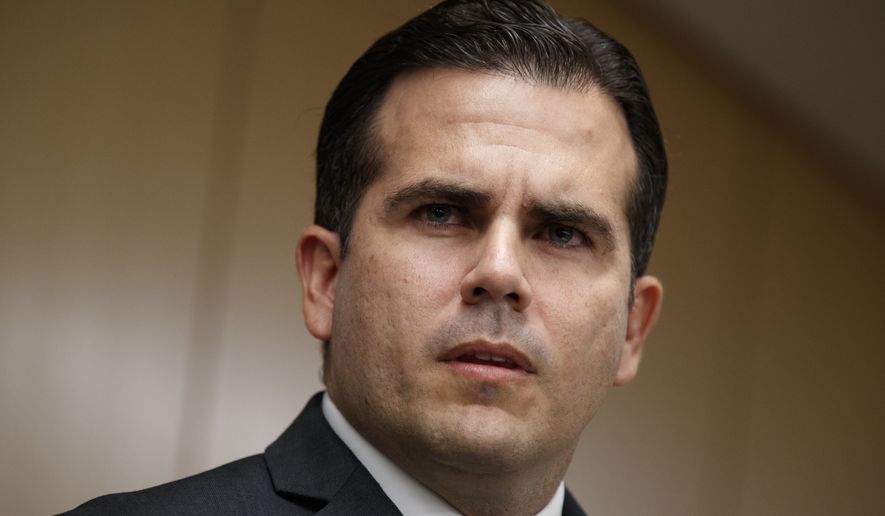Weary of their “colonial” status, a delegation of Puerto Ricans launched an aggressive push for statehood Wednesday, saying the island territory pays taxes and serves in the military but is being shortchanged by federal programs and lacks the political clout to recover from crises like Hurricane Maria.
Governor Ricardo Rosselló said Maria’s messy aftermath underscored the island’s second-tier status — until now, many Americans didn’t even know that Puerto Ricans were citizens — as it reaches for a fair share of hurricane relief funding, alongside Florida and Texas.
“This is the civil rights issue of this time,” Mr. Rossello said. “It is inconceivable in the 21st century to have the greatest democracy in the world have a colonial territory.”
Puerto Rico’s delegate to Congress — Resident Commissioner Jenniffer González-Colón — sits on Capitol Hill but cannot vote on legislation.
The District of Columbia and other territories face the same predicament, yet Republican leaders in Congress have been loath to admit new states, especially ones that would side with Democrats most of the time.
“It likely would add two Democratic senators and alter the balance of power within the institution,” said Darrell West, director of governance studies for the Brookings Institution, of Puerto Rican statehood.
Yet Mr. Rossello said at this point, there is no excuse for Congress to deny actual representation to the island.
A whopping 97 percent of the island’s voters supported statehood last year, up from 61 percent in 2012. The platforms of both political parties also have endorsed statehood or greater representation for Puerto Rico.
Hoping to hit the ground running, the statehood coalition named former Puerto Rico Gov. Carlos Romero Barceló and Republican committeewoman Zoraida Fonalledas as “shadow” senators, while Hall of Fame baseball catcher Ivan “Pudge” Rodriguez headlines a cast of five House representatives that will press members of Congress on statehood.
The shadow delegation plans to lobby on behalf of the 3.4 million Puerto Ricans until they get an admission act from Congress that clears the way for a binding vote back home to become the 51st state.
They will also leverage the voices of Puerto Ricans who moved to central Florida and can vote in swing-state elections.
“We will not be passive actors in this effort,” Mr. Rossello said.
The push reaches deep into the history books, mimicking Tennessee’s successful use of a shadow delegation in 1796 to morph from a territory to a state.
Yet experts say they Puerto Rico will have a tough time convincing Congress to act. For one thing, only a quarter of Puerto Rican voters participated in the June 2017 plebiscite that Mr. Rossello cited as proof of the island’s overwhelming desire for statehood.
“They know it’s a joke,” Amilcar Antonio Barreto, a cultural studies professor at Northeastern University, said of federal lawmakers.
He said the island is still roughly split over whether to become a state or remain a commonwealth, with a handful of others seeking independence. Plus, there is a cultural hurdle, in that Puerto Rico is a Spanish-speaking territory that wasn’t added as part of a westward expansion that created new states to absorb mostly-white populations.
Spain ceded Puerto Rico to the U.S. in 1898 at the end of the Spanish-American War. And while islanders gained U.S. citizenship about two decades later, island leaders say the federal government still acts like a colonial overlord.
It imposed a fiscal control board to straighten out its debt crisis, and unlike in the states, its Medicaid program is capped, making it difficult to deal with crises like the Zika virus.
Yet the uneven response to Hurricane Maria brought things to a head. Much of the island is still without power, nearly four months after the storm hit, and media investigations suggest the death toll has topped 1,000, even though the official toll is fewer than 70.
“Whether pegging it to recovery money or pegging it to fiscal reform, I do believe there is a higher consciousness” of Puerto Rico’s plight, Mr. Rossello said.
President Trump said the storm’s effects were exacerbated by crumbling infrastructure on the island, though critics have questioned his commitment to getting the island back on its feet, contrasting it with urgent efforts in Texas and Florida.
Alfonso Aguilar, a Republican and Latino activist named to the shadow delegation, said some people appear to be using Puerto’s Rico plight just to bash Mr. Trump, when the island’s lack of access to pots of money that states enjoy is the real problem. Statehood would put the island on equal footing with states that can tap emergency funds and health care dollars, he said.
Others said outright prejudice was to blame for the island’s status.
Mr. Barcelo said if Puerto Rico were an island of Irishmen instead of Hispanics, “We probably would have been a state long ago.”
• Tom Howell Jr. can be reached at thowell@washingtontimes.com.




Please read our comment policy before commenting.